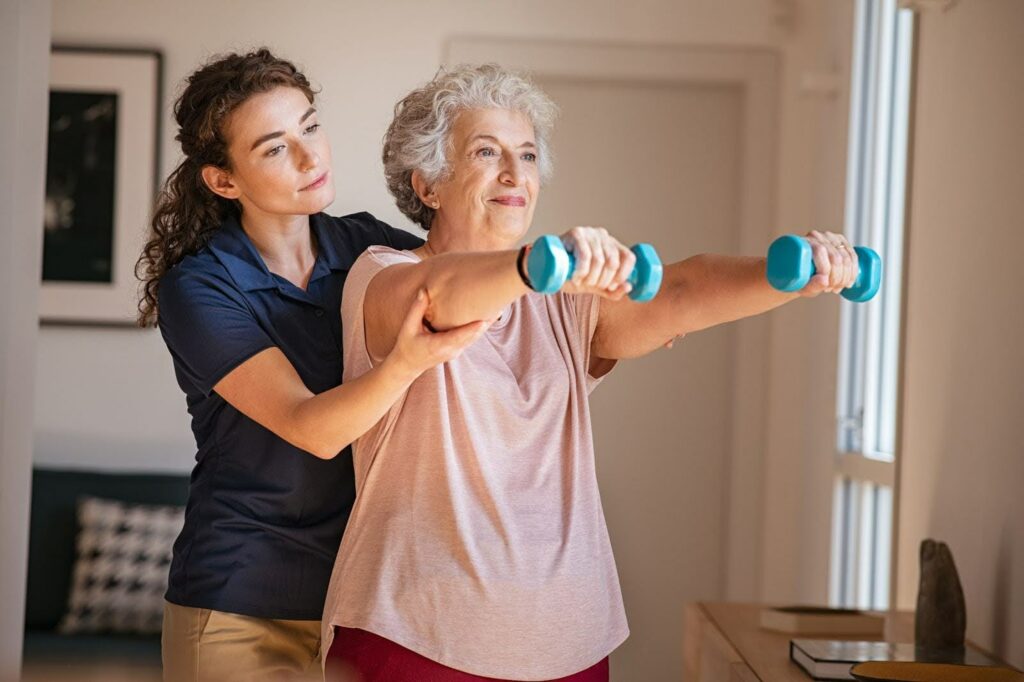Recovering Stronger: Rehab for the Elderly After a Hospital Stay
A hospital stay is often just the first step on the road to recovery for many older adults. Whether due to surgery, a sudden injury or illness, or a serious condition like a stroke, what comes next is just as important: Rehabilitation.
The right Rehabilitative services can make all the difference – helping seniors regain their strength, avoid complications, and get back to doing what they love. Without proper rehabilitation, there’s a higher risk of setbacks like rehospitalization, mobility loss, and loss of independence.
So, what are the rehabilitation options available, and how can you make the best choice for yourself or your loved one? Let’s take a closer look.
Why Rehabilitation Is Essential for Seniors After a Hospital Stay
There are many reasons a senior might need rehabilitation post hospital stay. Some of the most common include:
- Recovery from surgery (like a joint replacement)
- Healing from a fall or fracture
- Managing the aftereffects of a stroke
- Rebuilding strength after a prolonged illness
Without proper rehabilitation, recovery can stall. Seniors may struggle with daily activities or become more vulnerable to falls and infections. In some cases, they may end up back in the hospital.
That’s why rehab after a hospital stay is so essential – it supports physical healing, builds confidence, and helps restore independence.
2. Types of Rehab After a Hospital Stay
There’s no one-size-fits-all approach to recovery. Depending on you or your loved one’s needs, here are three main types of rehabilitation to consider:
Short-Term Rehab in Skilled Nursing Facilities
Ideal for those who need around-the-clock care and close medical supervision. Skilled Nursing facilities offer short-term Rehabilitation with access to medical professionals, on-site therapy, and support for medication and wound care.
In-Home Rehabilitation Services
This option allows seniors to begin recovering at home with support from visiting therapists. Services often include physical therapy, occupational therapy, and speech therapy – all provided in the comfort of home.
Outpatient Rehabilitation Programs
If a senior is mobile and able to travel, outpatient programs offer structured therapy sessions at a local rehabilitation center. It’s a good middle ground – especially after transitioning from a hospital or short-term rehab setting.

3. The Core Therapies That Drive Recovery
Rehabilitation typically involves a mix of therapies tailored to meet each senior’s specific goals and challenges, which include:
- Physical Therapy: Physical therapy focuses on improving strength, flexibility, balance, and coordination – which are all key to fall prevention and regaining mobility.
- Occupational Therapy: This helps older adults relearn essential daily tasks, such as dressing, bathing or preparing meals. These skills are vital for maintaining independence.
- Speech Therapy: Often used after a stroke or neurological issue, this therapy helps with communication, cognition, and safe swallowing.
Each of these therapies is a critical piece of the puzzle in helping patients regain function and confidence.
4. Choosing the Right Rehabilitation Option
Choosing a rehab facility or service for a loved one can feel overwhelming – but it doesn’t have to be. Here are a few key factors to consider:
- What are their medical care needs?
- Do they require assistance 24/7 or just a few times a week?
- What type of insurance or Medicare coverage is available?
- Would they feel more comfortable at home or in a community setting?
Family members play a big role in this decision – gathering information, touring communities, and ensuring the chosen option aligns with their loved ones’ preferences and goals. In some cases, assisted Living communities may also offer access to therapy and transitional care.
5. How To Support a Loved One Through Rehabilitation
Even with professional support, recovery isn’t always easy. That’s where family can make a big difference. Here’s how to help:
- Stay positive and encouraging – motivation goes a long way.
- Attend therapy sessions when possible to show support.
- Help prepare the home for a safe return – think grab bars, clear walkways, and easy-to-reach essentials.
- Celebrate small wins, whether it’s walking a few extra steps or mastering a new task.
Emotional encouragement and a little patience can help seniors stay engaged in their therapy and feel more confident in their progress.

The Right Rehabilitation Makes All the Difference
Rehabilitation is an essential part of recovery for older adults after a hospital stay. It’s not just about healing the body – it’s about helping seniors feel strong, capable, and in control of their lives again.
By exploring rehab options early and choosing the right path, families can ensure better outcomes and fewer setbacks.
Your Partner in Recovery
At Notre Dame Health Care, we specialize in helping seniors regain their strength and confidence after a hospital stay. Our dedicated team provides personalized Rehabilitative services – including physical therapy, occupational therapy, and speech therapy – within a warm, welcoming environment.
Contact us today to learn more or schedule a tour of our Notre Dame Long Term Care & Rehabilitation Center. We’re here to help every step of the way!